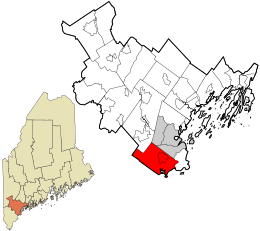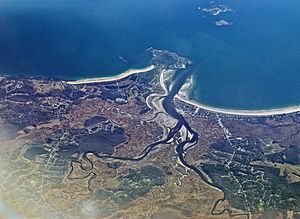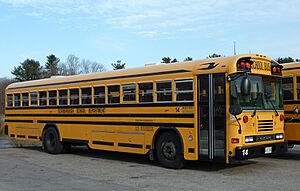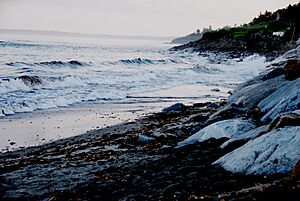Scarborough, Maine facts for kids
Quick facts for kids
Scarborough, Maine
|
||
|---|---|---|
|
||

Location in Cumberland County and the state of Maine.
|
||
| Country | United States | |
| State | Maine | |
| County | Cumberland | |
| Settled | 1635 | |
| Incorporated | July 14, 1658 | |
| Communities |
|
|
| Government | ||
| • Type | Council-Manager | |
| Area | ||
| • Total | 70.63 sq mi (182.93 km2) | |
| • Land | 47.61 sq mi (123.31 km2) | |
| • Water | 23.02 sq mi (59.62 km2) | |
| Elevation | 16 ft (5 m) | |
| Population
(2020)
|
||
| • Total | 22,135 | |
| • Density | 465/sq mi (179.5/km2) | |
| Time zone | UTC-5 (Eastern (EST)) | |
| • Summer (DST) | UTC-4 (EDT) | |
| ZIP codes |
04070, 04074
|
|
| Area code(s) | 207 | |
| FIPS code | 23-66145 | |
| GNIS feature ID | 0582714 | |
Scarborough is a town in Cumberland County, Maine. It is located on the southern coast of the U.S. state of Maine. The town is about 7 miles (11 km) south of Portland. Scarborough is part of the larger Portland metropolitan area.
In 2020, 22,135 people lived in Scarborough. This makes it the town with the most people in Maine.
Contents
History
Around 1630, a man named John V. Stratton opened a trading post. It was on Stratton Island in Saco Bay. In 1631, Captain Thomas Cammock received land called the "Black Point Patent." He built a house and moved there in 1635. This land is now known as Prouts Neck.
Thomas Cammock died in 1643. His wife, Margaret Cammock, took over the land. More settlements grew in the area. These included Black Point, Blue Point (now Pine Point), Dunstan, and Stratton Island. By 1650, there were 50 homes. People here were good at fishing and farming.
On July 14, 1658, all these settlements became one town. It was named Scarborough, after a town in England.
Early Conflicts
In 1675, a big war called King Philip's War started. Scarborough was an important town with over 100 houses. But by 1676, the town was destroyed. Many settlers were killed or taken hostage by Native Americans.
In 1677, soldiers from Massachusetts came to help. They were ambushed by warriors led by Chief Squandro. About 50 to 60 soldiers were killed or badly hurt. This event was called the Battle at Moore's Brook. In 1681, a large fort was built at Black Point. After more attacks during King William's War, the people left in 1690. They moved to safer places like Portsmouth, New Hampshire or Boston.
Rebuilding the Town
A peace agreement was signed in 1699. People started to resettle Scarborough in 1702. Seven settlers came from Lynn, Massachusetts. They began building a new fort on Prout's Neck. Captain John Larrabee was in charge of this fort.
In August 1703, about 500 French and Native American fighters attacked English settlements. They tried to capture the fort on Prout's Neck. The fort was on a high cliff. The attackers tried to dig a tunnel under the cliff to get inside. But a two-day rainstorm made the ground soft. This exposed the diggers to the fort's defenders. The attackers then left to find easier targets.
Even with more small attacks, the second settlement grew strong. By 1749, Scarborough was doing well. People exported cattle and timber. Many water power sites helped run a dozen sawmills.
Geography
Scarborough covers about 70.63 square miles (182.93 km²). About 47.61 square miles (123.31 km²) is land, and 23.02 square miles (59.62 km²) is water. Several rivers flow through the town, including the Scarborough River, Nonesuch River, Libby River, and Spurwink River.
The town is next to the Gulf of Maine, which is part of the Atlantic Ocean. The highest point in Scarborough is Beech Ridge, which is 215 feet (66 meters) high. In the past, people lit bonfires on Scottow Hill to warn others of danger.
Major roads like Interstate 95 and U.S. Route 1 pass through Scarborough. The town shares borders with Cape Elizabeth, South Portland, Westbrook, Gorham, Buxton, Saco, and Old Orchard Beach.
Population
| Historical population | |||
|---|---|---|---|
| Census | Pop. | %± | |
| 1800 | 2,099 | — | |
| 1810 | 2,094 | −0.2% | |
| 1820 | 2,232 | 6.6% | |
| 1830 | 2,106 | −5.6% | |
| 1840 | 2,172 | 3.1% | |
| 1850 | 1,837 | −15.4% | |
| 1860 | 1,807 | −1.6% | |
| 1870 | 1,692 | −6.4% | |
| 1880 | 1,847 | 9.2% | |
| 1890 | 1,794 | −2.9% | |
| 1900 | 1,865 | 4.0% | |
| 1910 | 1,945 | 4.3% | |
| 1920 | 1,832 | −5.8% | |
| 1930 | 2,445 | 33.5% | |
| 1940 | 2,842 | 16.2% | |
| 1950 | 4,600 | 61.9% | |
| 1960 | 6,418 | 39.5% | |
| 1970 | 7,845 | 22.2% | |
| 1980 | 11,347 | 44.6% | |
| 1990 | 12,518 | 10.3% | |
| 2000 | 16,970 | 35.6% | |
| 2010 | 18,919 | 11.5% | |
| 2020 | 22,135 | 17.0% | |
| U.S. Decennial Census | |||
In 2010, there were 18,919 people living in Scarborough. There were 7,506 households. About 33% of households had children under 18. The average age in town was 44.5 years.
What People Do Here
The main office for Hannaford supermarkets is located in Scarborough.
Schools
Scarborough has its own public school system for students from kindergarten to 12th grade.
- Scarborough High School
- Scarborough Middle School
- Wentworth Intermediate School
- Eight Corners Primary School
- Pleasant Hill Primary School
- Blue Point Primary School
Neighborhoods
Scarborough has several distinct neighborhoods:
- Blue Point
- Dunstan (also known as West Scarborough)
- Eight Corners
- Higgins Beach
- North Scarborough
- Oak Hill (the town center, where you'll find the town hall and high school)
- Pine Point (located between the Scarborough Marsh and Saco Bay)
- Pleasant Hill
- Prouts Neck (a peninsula that extends into the Gulf of Maine)
- West Scarborough (the northwestern part of town)
Fun Places to Visit
- Beech Ridge Motor Speedway
- Hannaford Supermarkets headquarters
- Higgins Beach
- Higgins Beach Market
- Scarborough Beach State Park
- Scarborough Downs
- Scarborough Historical Society & Museum
- Scarborough Marsh
- Scarborough Marsh Audubon Center
- Scarborough Public Library
- Scarborough River Wildlife Sanctuary
Notable People
Many interesting people have connections to Scarborough:
- Susan Alfond (born 1946), an investor and giver to good causes.
- Frank Bathe (born 1954), a retired professional ice hockey player.
- Joe Bessey (born 1961), a NASCAR team owner and driver.
- Greg Finley (born 1984), an American actor.
- Linwood M. Higgins (born 1948), a politician from Maine.
- Winslow Homer (1836–1910), a famous landscape artist and painter.
- Rufus King (1755–1827), one of America's Founding Fathers and a diplomat.
- Stephen King (born 1947), a very well-known author of many books.
- William King (1768–1852), the first Governor of Maine.
- Kelly Moore (born 1959), an American stock car racing driver.
- Ryan Moore (born 1983), an American stock car racing driver.
- Kelly Noonan Murphy (born 1974 or 1975), an American politician.
- Wyatt Omsberg (born 1995), a professional soccer player for MLS.
- Erin Pearl (born 1982), a former competitive figure skater.
See also
 In Spanish: Scarborough (Maine) para niños
In Spanish: Scarborough (Maine) para niños
 | Bayard Rustin |
 | Jeannette Carter |
 | Jeremiah A. Brown |





